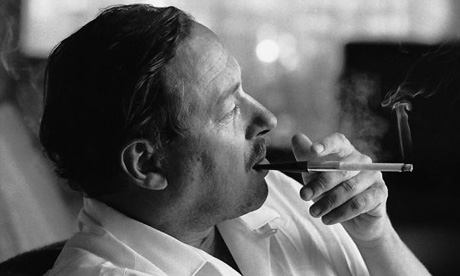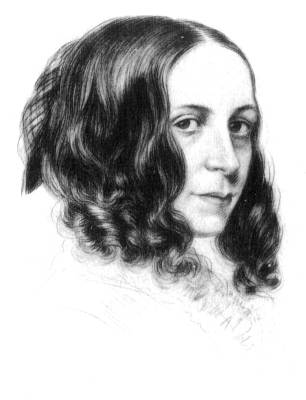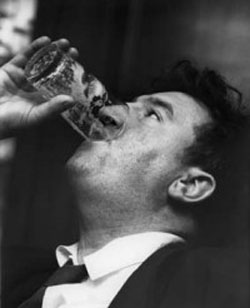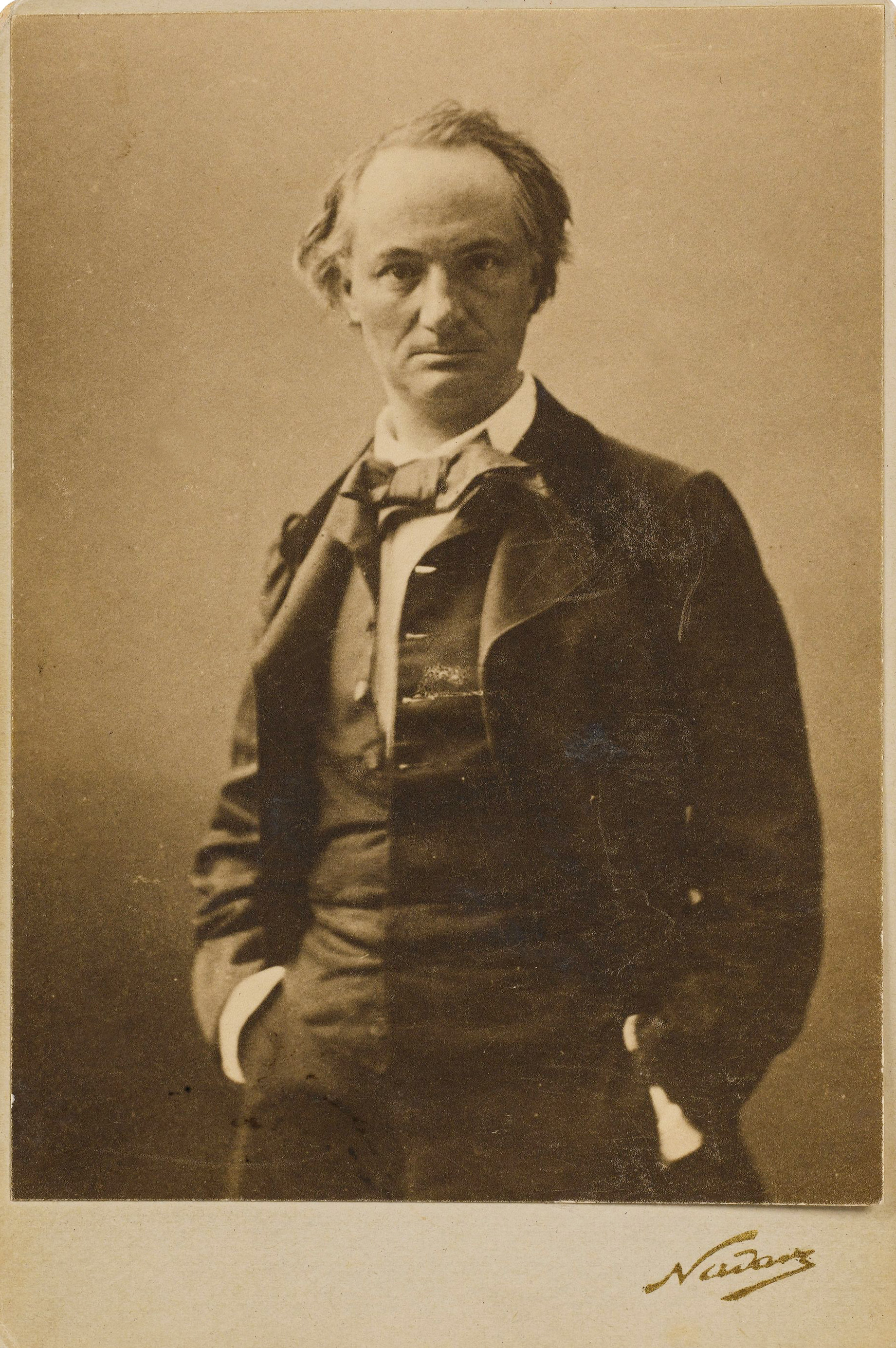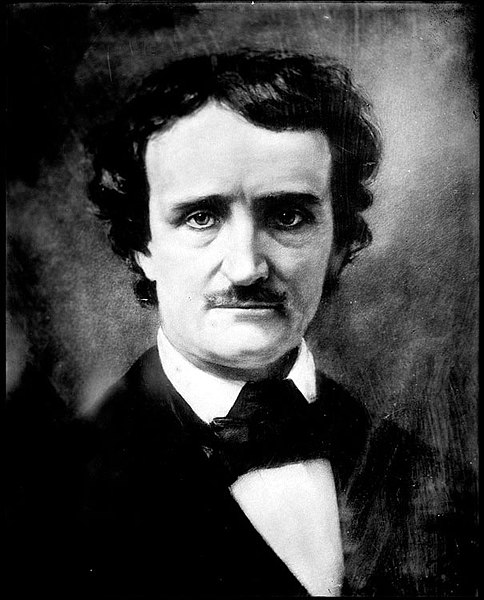You
You're a beast, she said
your big white belly
and those hairy feet.
you never cut your nails
and you have fat hands
paws like a cat
your bright red nose
and the biggest balls
I've ever seen.
You shoot sperm like a
whale shoots water out of the
hole in its back.
Beast beast beast,
she kissed me,
what do you want for
breakfast?
Mostrando postagens com marcador Poesia. Mostrar todas as postagens
Mostrando postagens com marcador Poesia. Mostrar todas as postagens
quarta-feira, 22 de dezembro de 2010
sábado, 13 de novembro de 2010
Charles Bukowski - Gloomy Lady
Gloomy Lady
She sits up there
drinking wine
while her husband
is at work.
She puts quite
some importance
upon getting her
poems published
in the little
magazines.
She's had two or
three of her slim
volumes of poems
done in mimeo.
She has two or
three children
between the ages
of 6 and 15.
She is no longer
the beautiful woman
she was. She sends
photos of herself
sitting upon a rock
by the ocean
alone and damned.
I could have had
her once. I wonder
if she thinks I
could have
saved her?
In all her poems
her husband is
never mentioned.
But she does
talk about her
garden
so we know that's
there, anyhow,
and maybe she
fucks the rosebuds
and finches
before she writes
her poems.
She sits up there
drinking wine
while her husband
is at work.
She puts quite
some importance
upon getting her
poems published
in the little
magazines.
She's had two or
three of her slim
volumes of poems
done in mimeo.
She has two or
three children
between the ages
of 6 and 15.
She is no longer
the beautiful woman
she was. She sends
photos of herself
sitting upon a rock
by the ocean
alone and damned.
I could have had
her once. I wonder
if she thinks I
could have
saved her?
In all her poems
her husband is
never mentioned.
But she does
talk about her
garden
so we know that's
there, anyhow,
and maybe she
fucks the rosebuds
and finches
before she writes
her poems.
Conexões:
Charles Bukowski,
Literatura,
Poesia,
Poetry
quinta-feira, 17 de junho de 2010
As últimas palavras registradas de Sylvia Plath
Leitura de um trecho de 'Flower Herding Pictures On Mount Monadnock', de Galway Kinnell.
Essas são as últimas palavras registradas da Sylvia Plath, em 10 de janeiro de 1963, antes do seu suicídio:
Essas são as últimas palavras registradas da Sylvia Plath, em 10 de janeiro de 1963, antes do seu suicídio:
In the forest I discover a flower.
The invisible life of the thing
Goes up in flames that are invisible
Like cellophane burning in the sunlight.
It burns up. Its drift is to be nothing.
In its covertness it has a way
Of uttering itself in place of itself,
Its blossoms claim to float in the Empyrean,
A wrathful presence on the blur of the ground.
The invisible life of the thing
Goes up in flames that are invisible
Like cellophane burning in the sunlight.
It burns up. Its drift is to be nothing.
In its covertness it has a way
Of uttering itself in place of itself,
Its blossoms claim to float in the Empyrean,
A wrathful presence on the blur of the ground.
The appeal to heaven breaks off.
The petals begin to fall, in self-forgiveness.
It is a flower. On this mountainside it is dying.
The petals begin to fall, in self-forgiveness.
It is a flower. On this mountainside it is dying.
Conexões:
Literatura,
Poesia,
Poetry,
Suicide,
Suicídio,
Sylvia Plath,
Vídeos
domingo, 13 de junho de 2010
O passageiro da tormenta
"Alguns vencem por seus crimes, outros são derrotados por suas virtudes." ShakespeareEx-presidiário comenta como conquistou sua liberdade e valores atribuídos à nova vida.
Uns dizem que ele é pretensioso, outros o admiram. Já ele considera-se o produto de seu fracasso e de sua vontade. Esse é Luiz Alberto Mendes, o ex-presidiário, condenado a mais de 100 anos, que passou de semi-analfabeto a estudante universitário.
Conexões:
Frases,
Frases e Citações,
Poesia,
Poetry,
Polêmica,
Presidiário,
Preso,
Prison,
Vídeos
quinta-feira, 25 de março de 2010
Edge (Sylvia Plath)
Edge
The woman is perfected.Her dead
Body wears the smile of accomplishment,
The illusion of a Greek necessity
Flows in the scrolls of her toga,
Her bare
Feet seem to be saying:
We have come so far, it is over.
Each dead child coiled, a white serpent,
One at each little
Pitcher of milk, now empty.
She has folded
Them back into her body as petals
Of a rose close when the garden
Stiffens and odors bleed
From the sweet, deep throats of the night flower.
The moon has nothing to be sad about,
Staring from her hood of bone.
She is used to this sort of thing.
Her blacks crackle and drag.
----------------------------------
Limite
A mulher está perfeita.
Seu corpo
Morto enverga o sorriso de completude,
A ilusão de necessidade
Grega voga pelos veios da sua toga,
Seus pés
Nus parecem dizer:
Já caminhamos tanto, acabou.
Cada criança morta, enrodilhada, cobra branca,
Uma para cada pequena
Tigela de leite vazia.
Ela recolheu-as todas
Em seu corpo, como pétalas
Da rosa que se encerra, quando o jardim
Enrija e aromas sangram
Da fenda doce, funda, da flor noturna.
A lua não tem porque estar triste
Espectadora de touca
De osso; ela está acostumada.
Suas crateras trincam, fissura.
translated by Luiz Carlos de Brito Rezende
(in FOLHETIM Poemas Traduzidos, Ed. Folha de S. Paulo, Brazil, 1987, p. 65)
(in FOLHETIM Poemas Traduzidos, Ed. Folha de S. Paulo, Brazil, 1987, p. 65)
Poema escrito 10 dias antes do seu suicídio.
Leia mais:
Em busca da identidade perdida de Sylvia Plath em Ariel, por Ruan Nunes.
Morrer é uma arte? Sylvia Plath e os suicídios do autor, por Lilia Loman.
Limites da sublimação na criação literária, por Ana Cecília Carvalho.
Conexões:
Literatura,
Poesia,
Poetry,
Psicanálise,
Psicologia,
Suicide,
Suicídio,
Sylvia Plath,
Vídeos
domingo, 21 de março de 2010
Medusa (Sylvia Plath)
Medusa
Off that landspit of stony mouth-plugs,
Eyes rolled by white sticks,
Ears cupping the sea's incoherences,
You house your unnerving head--God-ball,
Lens of mercies,
Your stooges
Plying their wild cells in my keel's shadow,
Pushing by like hearts,
Red stigmata at the very center,
Riding the rip tide to the nearest point of
departure,
Dragging their Jesus hair.
Did I escape, I wonder?
My mind winds to you
Old barnacled umbilicus, Atlantic cable,
Keeping itself, it seems, in a state of miraculous
repair.
In any case, you are always there,
Tremulous breath at the end of my line,
Curve of water upleaping
To my water rod, dazzling and grateful,
Touching and sucking.
I didn't call you.
I didn't call you at all.
Nevertheless, nevertheless
You steamed to me over the sea,
Fat and red, a placenta
Paralyzing the kicking lovers.
Cobra light
Squeezing the breath from the blood bells
Of the fuchsia. I could draw no breath,
Dead and moneyless,
Overexposed, like an X-ray.
Who do you think you are?
A Communion wafer? Blubbery Mary?
I shall take no bite of your body,
Bottle in which I live,
Ghastly Vatican.
I am sick to death of hot salt.
Green as eunuchs, your wishes
Hiss at my sins.
Off, off, eely tentacle!
There is nothing between us.
-----------------------------------
Medusa
Longe dessa península de boquilhas petrificadas,
Olhos revirados por varetas brancas,
Orelhas absorvendo as incoerências marinhas,
Você abriga sua cabeça débil — bola divina,
Lente de piedades,
Seus parasitas
Abastecem suas células selvagens à sombra de minha quilha,
Empurrando como corações,
Estigmas vermelhos bem no centro,
Cavalgando a contracorrente até o ponto de partida mais próximo.
Arrastando seus cabelos de Jesus.
Escapei, me pergunto?
Minha mente sopra até você
Umbigo de velhos mariscos, cabo Atlântico,
Se mantendo, parece, em estado de milagrosa conservação.
Em todo caso, você está sempre ali,
Respiração trêmula no fim da minha linha,
Curva d'água pulando
Em meu caniço, deslumbrante e agradecida,
Tocando e sugando.
Não chamei você.
Não chamei você mesmo.
No entanto, no entanto
Você navegou em minha direção,
Obesa e vermelha, uma placenta
Paralisando amantes impetuososos.
Luz de naja
Espremendo o hálito das rubras campânulas
Da fúcsia. Sem poder respirar,
Morta e sem dinheiro,
Superexposta, como num raio x.
Quem você pensa que é?
Hóstia de comunhão? Maria Carpideira?
Não vou tirar nenhum pedaço desse seu corpo,
Garrafa aonde vivo,
Vaticano terrível.
O sal quente me mata de enjôo.
Imaturos como eunucos, seus desejos
Sibilam para meus pecados.
Fora, fora, coleante tentáculo!
Não há mais nada entre nós.
Versão psicanalítica dos poemas Daddy e Medusa, da Sylvia Plath:
Nazistas, Medusa e a Poesia, por Vinícius Carvalho Pereira
Veja também:
Poema Daddy, da Sylvia Plath
Conexões:
Literatura,
Poesia,
Poetry,
Psicanálise,
Psicologia,
Sylvia Plath,
Vídeos
quinta-feira, 18 de março de 2010
Daddy (Sylvia Plath)
Daddy
You do not do, you do not do
Any more, black shoe
In which I have lived like a foot
For thirty years, poor and white,
Barely daring to breathe or Achoo.
Daddy, I have had to kill you.
You died before I had time---
Marble-heavy, a bag full of God,
Ghastly statue with one gray toe
Big as a Frisco seal
And a head in the freakish Atlantic
Where it pours bean green over blue
In the waters off the beautiful Nauset.
I used to pray to recover you.
Ach, du.
In the German tongue, in the Polish town
Scraped flat by the roller
Of wars, wars, wars.
But the name of the town is common.
My Polack friend
Says there are a dozen or two.
So I never could tell where you
Put your foot, your root,
I never could talk to you.
The tongue stuck in my jaw.
It stuck in a barb wire snare.
Ich, ich, ich, ich,
I could hardly speak.
I thought every German was you.
And the language obscene
An engine, an engine,
Chuffing me off like a Jew.
A Jew to Dachau, Auschwitz, Belsen.
I began to talk like a Jew.
I think I may well be a Jew.
The snows of the Tyrol, the clear beer of Vienna
Are not very pure or true.
With my gypsy ancestress and my weird luck
And my Taroc pack and my Taroc pack
I may be a bit of a Jew.
I have always been sacred of you,
With your Luftwaffe, your gobbledygoo.
And your neat mustache
And your Aryan eye, bright blue.
Panzer-man, panzer-man, O You----
Not God but a swastika
So black no sky could squeak through.
Every woman adores a Fascist,
The boot in the face, the brute
Brute heart of a brute like you.
You stand at the blackboard, daddy,
In the picture I have of you,
A cleft in your chin instead of your foot
But no less a devil for that, no not
Any less the black man who
Bit my pretty red heart in two.
I was ten when they buried you.
At twenty I tried to die
And get back, back, back to you.
I thought even the bones would do.
But they pulled me out of the sack,
And they stuck me together with glue.
And then I knew what to do.
I made a model of you,
A man in black with a Meinkampf look
And a love of the rack and the screw.
And I said I do, I do.
So daddy, I'm finally through.
The black telephone's off at the root,
The voices just can't worm through.
If I've killed one man, I've killed two---
The vampire who said he was you
And drank my blood for a year,
Seven years, if you want to know.
Daddy, you can lie back now.
There's a stake in your fat black heart
And the villagers never liked you.
They are dancing and stamping on you.
They always knew it was you.
Daddy, daddy, you bastard, I'm through.
| Fonte: CARVALHO, A. C. A poética do suicídio de Sylvia Plath. Ed. UFMG, 2003. Versão psicanalítica dos poemas Daddy e Medusa, da Sylvia Plath: | |
Conexões:
Literatura,
Poesia,
Poetry,
Psicanálise,
Psicologia,
Sylvia Plath,
Vídeos
quinta-feira, 11 de março de 2010
A Little Atomic Bomb (Charles Bukowski)
Just give me a little atomic bomb
Not too mutch just a little
Enough to kill a horse in the street
But there aren't any horses in the street
Enough to knock the flowers from a bowl
But I don't see any flowers in a bowl
Enough then to frigthen my love
But I don't have any love
Well give me an atomic bomb then to scrub in my bathtub
like a dirty and lovable child
I've got a bathtub
Just a little bomb general
With pugnose
Pink ears
Smelling like underclothes in July
Do you think I'm crazy?
I think your crazy too
So the way you think.
Send me one before somebody else does.
Criado por Adam Long
Ilustrações de Tom Keating
Ilustrações de Tom Keating
Conexões:
Beatnik,
Charles Bukowski,
Literatura,
Poesia,
Poetry,
Vídeos
domingo, 7 de março de 2010
Asas do desejo, ou o alcance da utopia
“Agora, eu sei o que nenhum anjo sabe”
Der Himmel über Berlin (O Céu sobre Berlim), título original em alemão. Por se tratar de uma co-produção franco-alemã, temos um segundo título, adotado em inglês e português, Asas do Desejo (Wings of Desire).
Uma obra-prima de Wim Wenders, de 1987, situada no Berlim pós-guerra, mas se torna atemporal ao considerarmos as questões existenciais da trama.
Dois anjos, Cassiel e Damiel, passam sua eternidade entre os humanos, mas não podem integrar-se a eles, dada a sua condição etérea. Damiel questionava sobre o sentido da sua existência e sentia-se incompleto por não poder vivenciar as experiências humanas. Quando se apaixona por Marion, encontra o momento de certeza para desejar abandonar a imortalidade e ser capaz de viver o seu amor.
O anjo sem poder ser coadjuvante da humanidade.
Os dois anjos escutam os pensamentos dos humanos, são espectadores do sofrimento, mas só conseguem proporcionar ao homem um conforto invisível e momentâneo, mas não a salvação. Só as crianças podiam vê-los, o que as aproximavam dos anjos, uma rica metáfora explorada no filme.
Marion também era dotada de asas, mas estas eram limitadas, apenas fixas na sua indumentária de trapezista para que desempenhasse seu ofício. Triste e introspectiva, apresentava seu espetáculo circense todas as noites. Destaco a magnífica cena em que Marion, prestes a abandonar sua esperança, apresenta uma inquietante demonstração no trapézio, sem se dar conta que o anjo que lhe salvaria a contemplava, num misto de fascinação e preocupação.
Filme-poema
Na ausência das asas do desejo, o homem é estagnado, preso por entre os muros da Berlim de Wenders.
Na ausência das asas do desejo, o homem é estagnado, preso por entre os muros da Berlim de Wenders.
E fica a nossa procura por esses anjos que se tornaram humanos.
A ótica metafísica do filme é que, para preencher o vazio da existência, nem ser humano, nem ser anjo, mas ser amado. E por isso o anjo Damiel abdica da sua solitária e vazia condição preto-e-branco e se entrega a esse intenso e vívido sentimento. Sua primeira grande prova de amor, tornar-se humano em um mundo envolto de tristezas. Um mundo em que ainda que fosse visto colorido, havia a velhice, o suicídio, a pobreza e a melancolia, todos explorados no filme.
O confronto entre o divino e o efêmero
Elenco:
• Bruno Ganz (Damiel)
• Solveig Dommartin (Marion)
• Otto Sander (Cassiel)
• Curt Bois (Homer)
• Peter Falk (Peter Falk)
• Hans Martin Stier (Homem à beira da morte)
• Sigurd Rachman (Suicida)
• Beatrice Manowski (Prostituta)
• Lajos Kovács (Técnico de Marion)
• Bruno Rosaz (Palhaço)
Não percam tempo com Cidade dos Anjos, filme que tentou ser o sucessor de Asas do Desejo, através de uma fórmula criada muito falha, resultando numa imitação extremamente inferior.
- Entre em contato comigo caso queira reproduzir esse texto.
Filme 16 anos de álcool
Conexões:
Asas do Desejo,
Autorretrato,
Existencialismo,
Filmes,
Metafísica,
Movie,
Poesia,
Poetry,
Vídeos,
Wim Wenders,
Wings of Desire
quarta-feira, 3 de março de 2010
As Dores do Dia (Isaías do Maranhão)
A tarde traz na face
as dores do amanhã
na cinza do projeto.
Vou
ao trabalho das nuvens
e trago os cântaros
da LUA.
De
que adianta a cabeça
racional, se os olhos
MOLHAM AS FACES
- DE LÁGRIMAS.
as dores do amanhã
na cinza do projeto.
Vou
ao trabalho das nuvens
e trago os cântaros
da LUA.
De
que adianta a cabeça
racional, se os olhos
MOLHAM AS FACES
- DE LÁGRIMAS.
Auerbach - Head of JYM
Conexões:
Arte Contemporânea,
Auerbach,
Isaías do Maranhão,
Literatura,
Poesia
terça-feira, 2 de março de 2010
Negros - Braços de Ouro (Isaías do Maranhão)
Meu corpo
é noite nos teus olhos
SUBTERRÂNEOS.
Tua boca retalha
meu corpo,
como chicote
tirando filé na carne
DE SENZALA.
Um braço negro,
- um canavial.
Dois braços
negros,
- o ouro da tua coroa...
dois mil braços
negros,
amarrados e esquartejados
NA SOMA DE MÁQUINAS
DUM BRASIL
- BARALHO.
é noite nos teus olhos
SUBTERRÂNEOS.
Tua boca retalha
meu corpo,
como chicote
tirando filé na carne
DE SENZALA.
Um braço negro,
- um canavial.
Dois braços
negros,
- o ouro da tua coroa...
dois mil braços
negros,
amarrados e esquartejados
NA SOMA DE MÁQUINAS
DUM BRASIL
- BARALHO.
Misha Gordin - Crowd 16
Conexões:
Arte Contemporânea,
Fotografia,
Isaías do Maranhão,
Literatura,
Misha Gordin,
Poesia
domingo, 28 de fevereiro de 2010
Tennessee Williams (1911 - 1983): Alcohol, Amphetamines, Barbiturates
"Most of the confidence which I appear to feel, especially when influenced by noon wine, is only a pretense."
Conexões:
Alcohol,
Amphetamines,
Barbiturates,
Frases e Citações,
Grave,
Literatura,
Poesia,
Poetry,
Tennessee Williams
sábado, 27 de fevereiro de 2010
William Faulkner (1897 - 1962): Alcohol
"All of us failed to match our dreams of perfection. So I rate us on the basis of our splendid failure to do the impossible."
"Todos nós falhamos em alcançar nossos sonhos de perfeição. Então eu classifico-nos como uma falência esplêndida em fazer o impossível."
Conexões:
Alcohol,
Frases e Citações,
Grave,
Literatura,
Poesia,
Poetry,
William Faulkner
Brendan Behan (1923 - 1964): Alcohol
"I only take a drink on two occasions: when I'm thirsty and when I'm not."
"Eu só bebo em duas ocasiões: quando eu estou com sede e quando eu não estou."
Conexões:
Alcohol,
Brendan Behan,
Frases e Citações,
Grave,
Literatura,
Poesia,
Poetry
Ernest Hemingway (1899 - 1961): Alcohol
"The world breaks everyone and afterward many are strong at the broken places. But those that will not break it kills. It kills the very good and the very gentle and the very brave impartially. If you are none of these you can be sure it will kill you too but there will be no special hurry." (A Farewell to Arms, 1929, ch. 34)
"An intelligent man is sometimes forced to be drunk to spend time with his fools.”
"Um homem inteligente às vezes é forçado a ficar bêbado para gastar um tempo com suas bobagens."
Conexões:
Alcohol,
Ernest Hemingway,
Frases e Citações,
Grave,
Literatura,
Poesia,
Poetry
quinta-feira, 25 de fevereiro de 2010
Charles Bukowski (1920 - 1994): Alcohol
"Drinking is an emotional thing. It joggles you out of everyday life, out of everything being the same. It yanks you out of your body and your mind and throws you against the wall. I have the feeling that drinking is a form of suicide where you're allowed to return to life and begin all over the next day. It's like killing yourself, and then you're reborn. I guess I've lived about ten or fifteen thousand lives now."
"Beber é algo emocional. Faz com que você saia da rotina do dia-a-dia, impede que tudo seja igual. Arranca você pra fora do seu corpo e de sua mente e joga contra a parede. Eu tenho a impressão de que beber é uma forma de suicídio onde você é permitido voltar à vida e começar tudo de novo no dia seguinte. É como se matar e renascer. Acho que eu já vivi cerca de dez ou quinze mil vidas."
Conexões:
Alcohol,
Cérebro e Mente,
Charles Bukowski,
Frases e Citações,
Grave,
Literatura,
Poesia,
Poetry
quarta-feira, 24 de fevereiro de 2010
Dylan Thomas (1914 - 1953): Alcohol
"Do not go gentle into that good night, / Old age should burn and rave at close of day; / Rage, rage against the dying of the light."
Conexões:
Alcohol,
Cérebro e Mente,
Dylan Thomas,
Frases e Citações,
Grave,
Literatura,
Poesia,
Poetry
Edgar Allan Poe (1809 - 1849): Alcohol
“I have absolutely no pleasure in the stimulants in which I sometimes so madly indulge. It has not been in the pursuit of pleasure that I have periled life and reputation and reason. It has been the desperate attempt to escape from torturing memories, from a sense of insupportable loneliness and a dread of some strange impending doom.”
"Eu absolutamente não tenho prazer em estimular algo que eu, por vezes, caí com tanta indulgência. Não foi pela busca do prazer que eu tenho arriscado a vida, a reputação e a razão. Foi apenas uma desesperada tentativa de escapar de memórias torturantes, de um senso de insuportável solidão e o horror de alguma estranha maldição repentina."
By a route obscure and lonely,
Haunted by ill angels only,
Where an Eidolon, named NIGHT,
On a black throne reigns upright,
I have reached these lands but newly
From an ultimate dim Thule —
From a wild weird clime that lieth, sublime,
Out of SPACE — out of TIME.
Dreamland, 1845
Conexões:
Alcohol,
Cérebro e Mente,
Dreamland,
Edgar Allan Poe,
Frases e Citações,
Grave,
Literatura,
Poesia,
Poetry
Assinar:
Postagens (Atom)





















